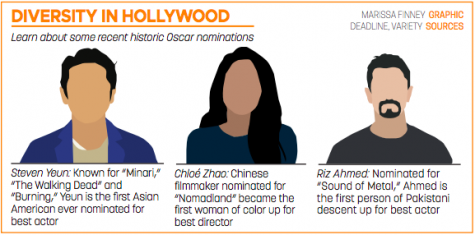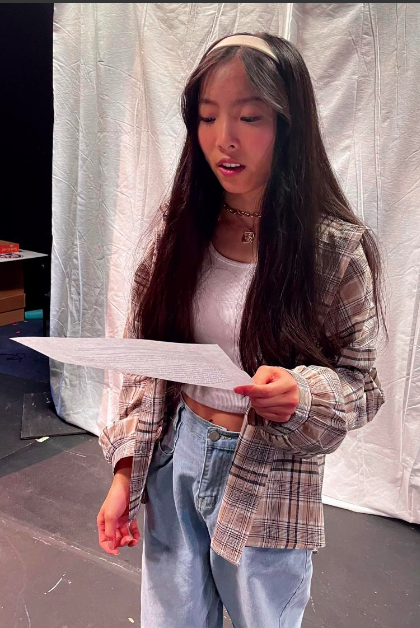The Oscars made headlines this year for its diverse nominations, particularly for those of Asian descent. Steven Yeun, nominated for his performance in “Minari,” is the first Asian American to be nominated in the Best Actor category. Riz Ahmed was also nominated for best actor for his role in “Sound of Metal.” Chloe Zhao made history as the first Chinese woman, and woman of color, to be nominated for best director at the Oscars.
Many people, such as IB film teacher James Peterson, praise these historic nominations.
“There was a time when minorities were not seen in film or on television or if they were, they were in a servant capacity,” Peterson said via email. “Then it seems that minorities moved into what was termed ‘token’ positions. These were almost as if the productions were trying to meet a quota or something. But recently, minorities in both race and gender have been taking the lead as characters and the centers of the plot.”
Along with this important precedent being set, discussions have sparked on the topic of representation, or lack thereof, of Asian Americans in TV and film. Junior Ayaan Abbasi, who is of Pakistani descent, is a New Edition choir member and part of the ensemble for the school’s rendition of “Mamma Mia: The Musical.” Abbasi believes that since the media is our main source of perception, having representation of underrepresented groups is crucial.
 “I think the media is essential in viewing anything,” Abbasi said. “So much of what we believe in as human beings is from what we’ve learned from Disney Channel, Nickelodeon, etc., so I think how the media portrays Asian Americans is a direct correlation to society’s treatment of us.”
“I think the media is essential in viewing anything,” Abbasi said. “So much of what we believe in as human beings is from what we’ve learned from Disney Channel, Nickelodeon, etc., so I think how the media portrays Asian Americans is a direct correlation to society’s treatment of us.”
Aleen Zhao, who is of Chinese descent and is an active member of the theater department, has similar thoughts on the subject.
“The media has such a big influence on people because everyone is viewing some type of media every single day,” Zhao said. “Of course whatever the media shows society is going to stick with society. You can’t ever really remove it because it has already impacted people. For Asian people, as the media portrays Asians with similar traits each time, they become stereotypes, which is how society starts to view Asians.”
The main issue does not solely lie in the lack of Asian Americans on screen. Accurate portrayals of Asian Americans, ones that do not base their identity around their ethnicity, are what will be the most impactful in diverting from stereotypes. Abbasi says that although there has been some progress in subverting these stereotypes, they are still prevalent and ingrained in society.
“I think that it has definitely become more accurate in the past few years, but it definitely has a ways to go,” Abbasi said. “We have movies like ‘Parasite’ that show Asian Americans as human beings rather than defined by their ethnicity, but then we still have TV shows like ‘The Big Bang Theory’ in which the one Indian character portrayed every single stereotype possible.”
Both Abbasi and Zhao touch on the fact that children’s TV shows and movies play a large role in imprinting false narratives of Asian Americans. This is especially important since children are so susceptible to people with a completely different culture than their own. As a kid, Abbasi took offense to the few Asian American characters on TV.
“There was quite literally one character that I saw on TV that was Asian American, and that was Ravi on ‘Jessie,’” Abbasi said. “While I’m not diminishing the actor by any means, the fact that Disney Channel had a teenager portray a character that was so blatantly stereotypical shows that change needs to happen. Ravi wore clothes that were often made fun of on the show, and he was increasingly portrayed as different from his siblings. That shows change needs to happen especially as this was not even 10 years ago.”
Zhao said she had similar experiences and explained how stereotypical portrayals lead to normalizations of mistreatment.
“The way Asians were depicted in the media was the same as how Asians were treated in real life because everyone had already gotten used to and accepted the stereotypes of Asians, and it had become normal,” Zhao said. “As a child, I always thought that it was normal for me to be treated a certain way because my other Asian classmates were treated the same way, and characters were portrayed the same way too.”
Similarly, Abbasi believes that Steven Yeun’s historic Oscar nomination has been long overdue.
Abbasi said, “The fact that in the 93 year history of the Oscars, this is the first Asian American nominated for Best Actor is appalling and shows that representation still has a long way to go.”
However, this year’s recognition of Asian American actors has definitely pushed the needle forward towards creating more inclusion in the media. Peterson agrees with this.
“Studios are willing to risk time and money if there is a proven audience,” Peterson said. “ Most new material has been proven in smaller markets, therefore, are more easily brought to studios or production houses. There are a number of small production houses that will risk including minorities of race or gender in their mainstream productions. I think we are moving in a positive direction, though it may be slow or not fast enough for some people. Personally, I’ve noticed the change and it has been a positive one.”




















![Joseph Broman, Mu Alpha Theta sponsor, grades tests for his honors precalculus/trigonometry class. Broman said, “I’m retiring from the Math Club next year and I’m just going to do Mu Alpha Theta so I can focus on that one and we can do more [speaker series] first semester.”](https://hilite.org/wp-content/uploads/2024/03/IMG_9502-1200x900.jpg)










![British royalty are American celebrities [opinion]](https://hilite.org/wp-content/uploads/2024/03/Screenshot-2024-03-24-1.44.57-PM.png)


![The new “Kung Fu Panda 4” movie: a journey of growth, self-realization and adventure [opinion]](https://hilite.org/wp-content/uploads/2024/03/po-1200x588.png)


















![Review: “The Bear” sets an unbelievably high bar for future comedy shows [MUSE]](https://hilite.org/wp-content/uploads/2024/03/unnamed.png)
![Review: “Mysterious Lotus Casebook” is an amazing historical Chinese drama [MUSE]](https://hilite.org/wp-content/uploads/2024/03/0.webp)
![Thea Bendaly on her Instagram-run crochet shop [Biz Buzz]](https://hilite.org/wp-content/uploads/2024/03/IMG_0165-1200x838.jpg)
![Review: Sally Rooney’s “Normal People,” is the best book to read when you are in a time of change [MUSE]](https://hilite.org/wp-content/uploads/2024/03/20047217-low_res-normal-people.webp)
![Review: “One Day” broke me for the second time, but this time it hurt worse [MUSE]](https://hilite.org/wp-content/uploads/2024/03/unnamed-8.png)
![Review in Print: Maripaz Villar brings a delightfully unique style to the world of WEBTOON [MUSE]](https://hilite.org/wp-content/uploads/2023/12/maripazcover-1200x960.jpg)
![Review: “The Sword of Kaigen” is a masterpiece [MUSE]](https://hilite.org/wp-content/uploads/2023/11/Screenshot-2023-11-26-201051.png)
![Review: Gateron Oil Kings, great linear switches, okay price [MUSE]](https://hilite.org/wp-content/uploads/2023/11/Screenshot-2023-11-26-200553.png)
![Review: “A Haunting in Venice” is a significant improvement from other Agatha Christie adaptations [MUSE]](https://hilite.org/wp-content/uploads/2023/11/e7ee2938a6d422669771bce6d8088521.jpg)
![Review: A Thanksgiving story from elementary school, still just as interesting [MUSE]](https://hilite.org/wp-content/uploads/2023/11/Screenshot-2023-11-26-195514-987x1200.png)
![Review: When I Fly Towards You, cute, uplifting youth drama [MUSE]](https://hilite.org/wp-content/uploads/2023/09/When-I-Fly-Towards-You-Chinese-drama.png)
![Postcards from Muse: Hawaii Travel Diary [MUSE]](https://hilite.org/wp-content/uploads/2023/09/My-project-1-1200x1200.jpg)
![Review: Ladybug & Cat Noir: The Movie, departure from original show [MUSE]](https://hilite.org/wp-content/uploads/2023/09/Ladybug__Cat_Noir_-_The_Movie_poster.jpg)
![Review in Print: Hidden Love is the cute, uplifting drama everyone needs [MUSE]](https://hilite.org/wp-content/uploads/2023/09/hiddenlovecover-e1693597208225-1030x1200.png)
![Review in Print: Heartstopper is the heartwarming queer romance we all need [MUSE]](https://hilite.org/wp-content/uploads/2023/08/museheartstoppercover-1200x654.png)













![Review: Ladybug & Cat Noir: The Movie, departure from original show [MUSE]](https://hilite.org/wp-content/uploads/2023/09/Ladybug__Cat_Noir_-_The_Movie_poster-221x300.jpg)

![Review: Next in Fashion season two survives changes, becomes a valuable pop culture artifact [MUSE]](https://hilite.org/wp-content/uploads/2023/03/Screen-Shot-2023-03-09-at-11.05.05-AM-300x214.png)
![Review: Is The Stormlight Archive worth it? [MUSE]](https://hilite.org/wp-content/uploads/2023/10/unnamed-1-184x300.png)


